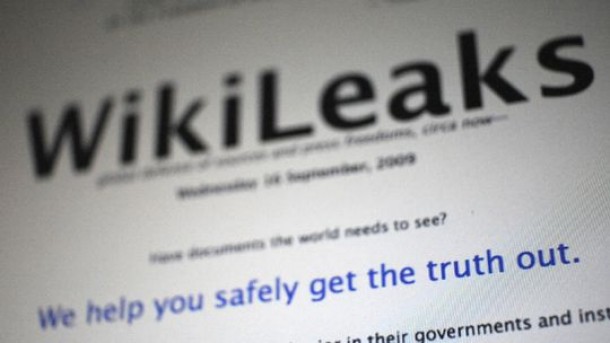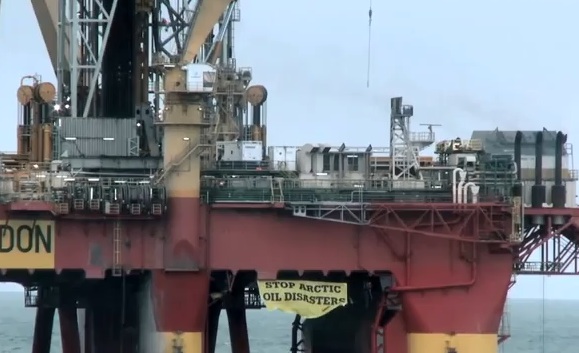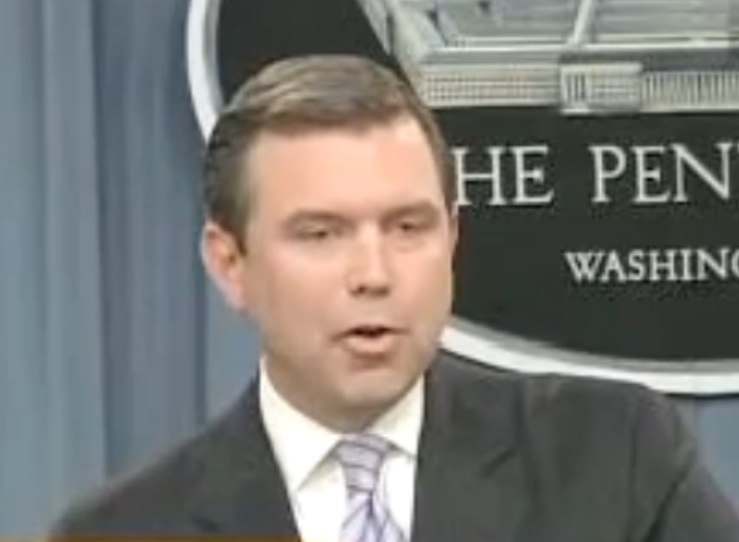 This is a "WikiLeaks News Update," constantly updated throughout each day. The blog tracks stories that are obviously related to WikiLeaks but also follows stories related to freedom of information, transparency, cybersecurity, freedom of expression, and sometimes the national security establishment of the United States because each issue/topic helps one further understand WikiLeaks and vice versa.
This is a "WikiLeaks News Update," constantly updated throughout each day. The blog tracks stories that are obviously related to WikiLeaks but also follows stories related to freedom of information, transparency, cybersecurity, freedom of expression, and sometimes the national security establishment of the United States because each issue/topic helps one further understand WikiLeaks and vice versa.
All the times are EST. You can contact me at kgosztola@hotmail.com with any news tips. Twitter username is @kgosztola. Also, if you are looking for some insightful discussion of stories related to WikiLeaks, I encourage you to check out the catalog of podcasts posted here at WL Central from the "This Week in WikiLeaks" show I produce every week.
10:15 PM Attorney General Eric Holder's Justice Department not only going after WikiLeaks and its supporters but also targeting antiwar and international solidarity activists. Politico reports on how union support for the targeted activists could be a headache for President Obama as he works toward re-election.
Any way WikiLeaks supporters can make the targeting of WikiLeaks a headache for Obama's re-election campaign?
9:45 PM Greek cables: Ta Nea covers what a US diplomat in Greece thought about the university asylum law.
 The past twenty four hours saw some big stories related to WikiLeaks break.
The past twenty four hours saw some big stories related to WikiLeaks break.
-The Grand Jury investigation into WikiLeaks widened as news subpoenas were issued to individuals like David House, co-founder of the Bradley Manning Support Network.
-The US government's case against Thomas Drake totally imploded. He accepted a misdemeanor plea deal and will likely serve no jail time primarily because the government did not want to make its case against Drake with information on classified technology.
-Andy Greenberg of Forbes.com reported on an ACLU lawsuit against the government for not complying with FOIA requests for specific US State Embassy cables
I had Trevor Timm, the person behind the @WLLegal Twitter account, record a podcast to talk about these recent WikiLeaks-related stories.
To listen, click play on the embedded player below (Or, go here to listen and download.)
 A student at the Medill School of Journalism at Northwestern University in Chicago was gracious enough to invite me to speak on a panel on Bradley Manning, the alleged whistleblower to WikiLeaks, which he had to put together for his “Media, Ethics and the Law” class. I participated in the panel this morning.
A student at the Medill School of Journalism at Northwestern University in Chicago was gracious enough to invite me to speak on a panel on Bradley Manning, the alleged whistleblower to WikiLeaks, which he had to put together for his “Media, Ethics and the Law” class. I participated in the panel this morning.
In addition to myself, the student informed me Timothy McNulty, a foreign editor for the Chicago Tribune who covered the Iraq invasion and the Afghanistan War, and Paul Rosenzweig, Carnegie Visiting Fellow and former Department of Homeland Security official, would be participating. A couple of student journalists would speak during the panel as well.
McNulty and Rosenzweig were both present in the classroom where the panel was held. I was in The Nation Magazine office in Manhattan, New York.
The student who organized the panel had me call in and put me on speakerphone. I was able to listen to what McNulty and Rosenzweig were saying.
Rosenzweig began the panel saying with assurance there isn’t any doubt the material WikiLeaks has released has caused risks. He said lists have been created of people who were listed in the documents—lists featuring the names of informants—and the Taliban has been hunting these people down.
Rosenzweig cited a Zimbabwe opposition leader who many believe to be endangered as another example of the risks WikiLeaks’ releases have created. He said there are good laws on secrecy, files released contained information on whereabouts of Osama bin Laden, and he has no problem with Manning being prosecuted.
McNulty agreed. And I was greatly disturbed by the falsehoods that McNulty let stand and made certain that I was able to comment.
 The Dawn Media Group in partnership with WikiLeaks has been releasing the "Pakistan Papers." Thus far, some of the revelations include the following: US was concerned that Pakistan would oppose its policies at the United Nations; US was worried Pakistan would purchase oil from Iran, allowing them to get a foothold in Pakistan; Pakistan's government was upset with US funding for the Pakistan military, which led to increased civil-military tensions; Pakistan's military asked for continued drone coverage; the US has had troops deployed on Pakistan soil; Saudi Arabia and the UAE have been financing jihadist groups in Pakistan and the US did not provide Benazir Bhutto with proper security.
The Dawn Media Group in partnership with WikiLeaks has been releasing the "Pakistan Papers." Thus far, some of the revelations include the following: US was concerned that Pakistan would oppose its policies at the United Nations; US was worried Pakistan would purchase oil from Iran, allowing them to get a foothold in Pakistan; Pakistan's government was upset with US funding for the Pakistan military, which led to increased civil-military tensions; Pakistan's military asked for continued drone coverage; the US has had troops deployed on Pakistan soil; Saudi Arabia and the UAE have been financing jihadist groups in Pakistan and the US did not provide Benazir Bhutto with proper security.
For this episode of "This Week in WikiLeaks," the show has part two of an interview that was done with Raza Rumi, a writer based in Lahore, Pakistan. Rumi regularly writes for the Pakistani weekly The Friday Times, The News and Daily DAWN on myriad topics such as history, arts, literature and society. Rumi has worked in Pakistan and abroad in various organizations including multilateral institutions such as the United Nations.
Rumi's writing can be read here.
[*Note: This is the second part of "This Week in WikiLeaks" for the week. You'll find part one, an interview with Kevin Zeese of the Bradley Manning Support Network on the one year anniversary of Manning's arrest here.]
To hear the show, click play on this embedded player.
 FROM THE CABLES/GITMO FILES
FROM THE CABLES/GITMO FILES
Dominique Strauss-Kahn may be just one of many diplomats or international officials alleged to have abused maids or nannies in the United States:
In April 2007, a Tanzanian maid filed a lawsuit against Alan Mzengi, a minister-counselor at the Tanzanian Embassy. She alleged the Mzengis kept her as “a virtual prisoner in their residence, stripping her of her passport, refusing to permit her to leave the house unaccompanied.” The lawsuit states she was not paid for her four years of work.
On this case, Reuters reports a US State Embassy cable from December 2009 shows the US government asked the Tanzanian government to investigate saying, “While payment of the lost wages to Ms. Mazengo is our first priority, we also hope that any diplomat who has treated his domestic staff in such an abusive manner would face appropriate sanction upon his return home," the cable said.
The State Department continues to monitor a possible Tanzania investigation and claims it will be getting “tough on alleged abuse of domestic workers by foreign diplomats.”
Cables deal with Canadian electricity:
One story out from CBC reports that Prince Edward Island utility Maritime Electric was part of Hydro-Québec's plans for purchase of NB Power. In October 2009, as the New Brunswick government was considering a $4.8 billion deal that was politically unpopular, the possibility of a sale was denied. The cables show it was seriously considered.
 BBC’s report on US State Embassy cables from WikiLeaks detailing the “hidden agenda” of northern Arctic states has led Greenpeace to call “on the Arctic Council to place an immediate moratorium on industrial exploitation within the area that has historically been covered by sea ice.”
BBC’s report on US State Embassy cables from WikiLeaks detailing the “hidden agenda” of northern Arctic states has led Greenpeace to call “on the Arctic Council to place an immediate moratorium on industrial exploitation within the area that has historically been covered by sea ice.”
Truls Gulowsen, Arctic campaign leader for Greenpeace Nordic, writes, “What the Arctic needs in this time of extreme external pressure is a protection against additional threats from dangerous shipping, oil exploitation, bottom-trawling, over-fishing and other destructive industrial practices.” Gulowsen also points out the “more immediate and more dangerous safety issue” is that moves into the “fragile Arctic to drill for oil” will create a threat of oil spills and likely impact the marine environment.
The Financial Times post on the cables highlights some of the noteworthy revelations in the cables:
 A statement from the Pentagon was published just after 9 pm ET on April 24th, no more than an hour or two after the New York Times had posted their package covering the Gitmo Files they had not obtained from WikiLeaks. The statement was posted on NPR and the Times website. Yet, again, it seems this is an instance of complete collusion between the press and government.
A statement from the Pentagon was published just after 9 pm ET on April 24th, no more than an hour or two after the New York Times had posted their package covering the Gitmo Files they had not obtained from WikiLeaks. The statement was posted on NPR and the Times website. Yet, again, it seems this is an instance of complete collusion between the press and government.
Michael Calderone reports "representatives from NPR and the Times visited the White House and spoke with Pentagon spokesman Geoff Morrell and members of Joint Task Force Guantanamo." And, "The news organizations agreed to some redactions requested by government officials but not all of them."
Recall, in February, it was found out that the Times had met with the State Department prior to their release of the US State Embassy Cables. Marcy Wheeler over at Firedoglake highlighted NYT’s close cooperation with the State Department:
Because of the range of the material and the very nature of diplomacy, the embassy cables were bound to be more explosive than the War Logs. Dean Baquet, our Washington bureau chief, gave the White House an early warning on Nov. 19. The following Tuesday, two days before Thanksgiving, Baquet and two colleagues were invited to a windowless room at the State Department, where they encountered an unsmiling crowd. Representatives from the White House, the State Department, the Office of the Director of National Intelligence, the C.I.A., the Defense Intelligence Agency, the F.B.I. and the Pentagon gathered around a conference table. Others, who never identified themselves, lined the walls. A solitary note-taker tapped away on a computer.
Theme by Danetsoft and Danang Probo Sayekti inspired by Maksimer